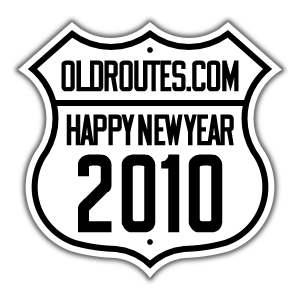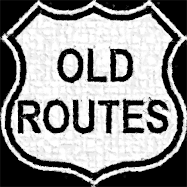One of the first freeways built in the western US, was the Pasadena Freeway. Originally called Arroyo Seco Parkway, it has also been known at US 66 and now "The 110". The parkway was the beginning of the massive web of freeways around Los Angeles.
Arroyo Seco is Spanish for Dry Streambed. This route was first used by wagons in the 1800's during the dry summer season as a better alternate than the regular roads. There were attempts to use the path for an elevated bicycle route at the end of the 19th century, but the bicycle craze ended, especially since a rail line was there and the motorcar was starting to change the traveling landscape.
The Parkway was in some ways designed as more of a park than a roadway. It was very modern for 1940. The route became a speedy way for the business barons to commute between they downtown jobs and their beautiful homes in the Pasadena suburbs. Instead of solid medians there were merely flowers and a art deco curb dividing the northbound from the southbound lanes.
The parkway was built with stylish Art Deco bridges, tunnels and overpasses. Most of the ramps were an easy merge with the lighter traffic then, but some of the intersections were right angle turns giving hardly any time to get up to speed. Some still have a stop sign protecting you from the steady stream of cars flying by. A few of the bridges were built to cross the Arroyo Seco canyon long before the consideration of a freeway.
Built to handle 27,000 cars a day at 45 mph, it was a relaxing drive down the parkway. As Los Angeles expanded and more freeways were built the medians floral displays gave way to a steel railing. Today the freeway carries about 125,000 cars on virtually the same roadway that was opened 70 years ago.
The California Department of Transportation (or Caltrans) say it's a very accident prone highway due to speeding drivers. Many accidents damage the divider's steel railing. It's harder to repair than a concrete barrier and concrete barriers are safer, too. Since there is no good alternate for traveling between Pasadena and L.A., the state transportation department is in process of changing the parkway into a less dangerous and more-modern freeway. However, when it comes to a Historic Highway, safety isn't everything to everybody. Some are protesting the safety improvements as too much of a change to this National Civil Engineering Landmark.
Among the original design features to be removed are the curbs with designations built in to note the direction of travel. Parkway lovers say that those designations are as important as the Art Deco bridges and sycamore trees lining the route.
The changes still appear to be on the Caltrans schedule.
Links
AP News Story
History at Wikipedia
Postcard views
LA Times construction photos
Virtual Drive The 110
Google Map
Downloadable Los Angeles Map
The Freeways of Los Angeles Book
Copyright 2010






